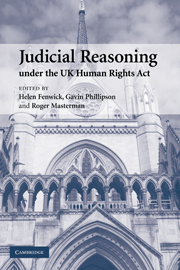Book contents
- Frontmatter
- Contents
- List of contributors
- Foreword
- Preface and acknowledgments
- Table of cases
- Table of legislation
- Table of treaties
- 1 The Human Rights Act in contemporary context
- PART I The interpretation of the Human Rights Act 1998
- 2 The European Convention on Human Rights and the Human Rights Act: the view from the outside
- 3 Aspiration or foundation? The status of the Strasbourg jurisprudence and the ‘Convention rights’ in domestic law
- 4 Institutional roles and meanings of ‘compatibility’ under the Human Rights Act 1998
- 5 Choosing between sections 3 and 4 of the Human Rights Act 1998: judicial reasoning after Ghaidan v. Mendoza
- 6 Clarity postponed: horizontal effect after Campbell
- 7 The standard of judicial review after the Human Rights Act
- 8 Principles of deference under the Human Rights Act
- PART II The Human Rights Act and substantive law
- Index
6 - Clarity postponed: horizontal effect after Campbell
Published online by Cambridge University Press: 30 October 2009
- Frontmatter
- Contents
- List of contributors
- Foreword
- Preface and acknowledgments
- Table of cases
- Table of legislation
- Table of treaties
- 1 The Human Rights Act in contemporary context
- PART I The interpretation of the Human Rights Act 1998
- 2 The European Convention on Human Rights and the Human Rights Act: the view from the outside
- 3 Aspiration or foundation? The status of the Strasbourg jurisprudence and the ‘Convention rights’ in domestic law
- 4 Institutional roles and meanings of ‘compatibility’ under the Human Rights Act 1998
- 5 Choosing between sections 3 and 4 of the Human Rights Act 1998: judicial reasoning after Ghaidan v. Mendoza
- 6 Clarity postponed: horizontal effect after Campbell
- 7 The standard of judicial review after the Human Rights Act
- 8 Principles of deference under the Human Rights Act
- PART II The Human Rights Act and substantive law
- Index
Summary
Introduction
The issue of whether the Human Rights Act imports Convention rights – or Convention principles – into private law is of great importance to the judicial attitude towards the HRA project. This chapter seeks not simply to analyse the doctrinal treatment of the issue by the courts, but to suggest, tentatively, some considerations underlying the judicial approach to it which might explain the result that, six years after the HRA came into force, there is still considerable ambiguity surrounding this point. I start with the following contention: that to allow what was hitherto an international treaty to penetrate deep into the common law was something about which the judiciary was always likely to feel ambivalent. It is one thing when Parliament simply replaces an area of common law with a statutory code – though it may be noted that even the enactment of a new statutory code in a particular area has not prevented the judiciary from developing the common law in a way that arguably circumvents or subverts it. But for Parliament to enact a statute that had the capacity to colonise whole swathes of the common law with general Convention principles was quite another matter: it threatened the whole traditional common law style of reasoning and the judiciary's autonomy in developing it.
- Type
- Chapter
- Information
- Judicial Reasoning under the UK Human Rights Act , pp. 143 - 173Publisher: Cambridge University PressPrint publication year: 2007
- 4
- Cited by



